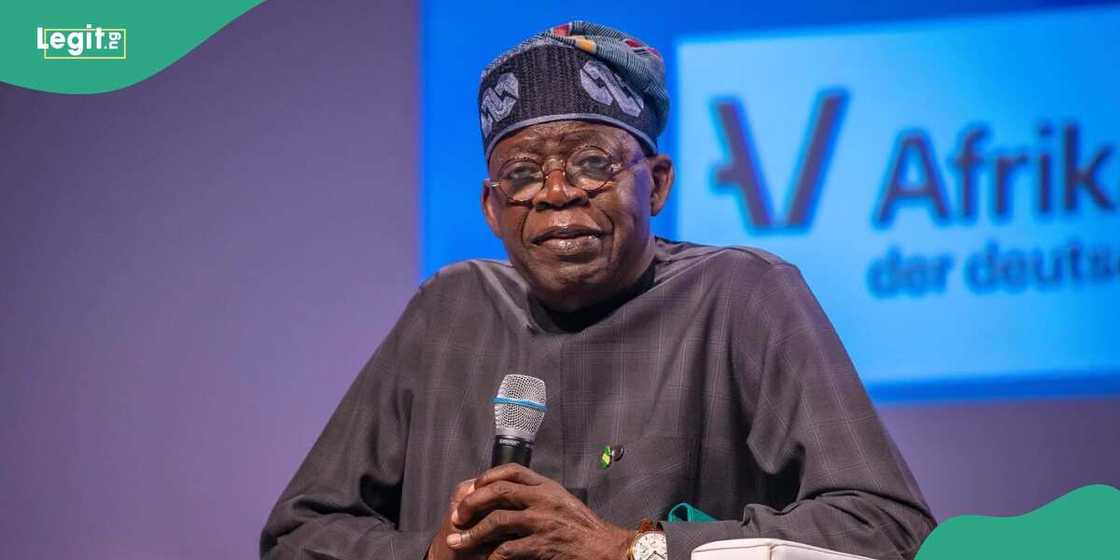Tinubu’s New Borrowings Take Nigeria’s Public Debt Surging to N97.34 Trillion
- The Debt Management Office has stated that Nigeria’s total public debt has hit N97.34 billion in 2023
- The agency stated new borrowings from the federal government to fund the shortfall of the 2024 budget were responsible for the new debt profile
- The development comes as the Nigerian government is reportedly expecting a $500 million loan from the World Bank later in 2024
Legit.ng’s Pascal Oparada has reported on tech, energy, stocks, investment and the economy for over a decade.
Data from the Debt Management Office (DMO) has revealed that Nigeria’s public debt has hit about N97.34 trillion as of Q4 2023.
DMO stated this in a statement on Friday, March 22, 2024.

Source: Facebook
Nigeria borrows to fund 2024 budget
The DMO said Nigeria’s public debt, as of December 31, 2023, stood at 97.34 trillion or $108.22 billion.
DMO said:
“This amount comprises the domestic and external debt stocks of the Federal Government of Nigeria, the 36 state governments and the Federal Capital Territory.”
According to the statement, the amount shows a significant increase compared to the N89.43 trillion recorded in September 2023.
The agency disclosed that this was mainly due to new domestic borrowings by the Tinubu government to finance the deficit in the 2024 Appropriation Act and disbursement by multilateral and bilateral lenders.
Nigeria’s external and domestic debt balloons
Punch reported that DMO stated that at N59.12 trillion, Nigeria’s total domestic debt accounted for 61% of the total debt stock, while external debt at N14.382 trillion accounted for the balance of 39%.
“Consistent with the debt management strategy, Nigeria’s external debt stock was skewed in favour of loans from multilateral (49.77 per cent) and bilateral lenders (14.02 per cent ) or a total of 63.79 per cent, which are mostly concessional and semi-concessional,” DMO added.
DMO stated that it has continued to employ the best practices in public debt management and is committed to increasing the country’s revenue
“Whilst the DMO continues to employ best practice in public debt management, the recent and ongoing efforts of the fiscal authorities to shore up revenue will support debt sustainability,” it stated.
FG lines up new borrowings from the World Bank
Legit.ng previously reported that the Nigerian government is about to secure another loan to the tune of $500 million from the World Bank to boost rural access and agricultural marketing in Nigeria.
According to reports, the initiative has been named the Rural Access and Agricultural Marketing Project -Scale-up (RAAMP-SU), and it is designed to bridge the gap between rural communities and the broader marketplace, supporting smoother access to agricultural markets, schools, and hospitals and promoting social cohesion among the rural populace.
According to the information, the loan approval date is November 28, 2024, with the estimated appraisal set for July 16, 2024. The new loan project has an anticipated board approval of November 28, 2024.
Loan to open up access to rural areas
The World Bank is reportedly offering $500 million despite the loan having a commitment of $550 million, which is 79% higher than the initial World Bank commitment amount of $280 million for the parent project.
The project aims to enhance the infrastructural and institutional framework for developing, maintaining, and managing Nigeria's rural road network.
The new funding seeks to escalate the project impact from 19 to all 36 states of Nigeria, heralding a new era of rural development and agricultural efficiency.
Analysts believe that the new loan, when approved, will take Nigeria’s external borrowing to a new high.
Nigeria’s debt stock hits N82 trillion
Legit.ng reported that Nigeria’s public debt has risen to N82 trillion from N77 trillion before the Central Bank of Nigeria (CBN) exchange rate unification, announced on Wednesday, June 14, 2023.
According to a press release by the CBN, all exchange rate windows are collapsed into the Importers and Exporters (I&E) window, showing a merger of the multiple exchange rates.
The unification has seen the naira fall to N664 per dollar and has attracted severe consequences for the nation’s economy, including a spike in public debt.
PAY ATTENTION: Donate to Legit Charity on Patreon. Your support matters!
Source: Legit.ng


